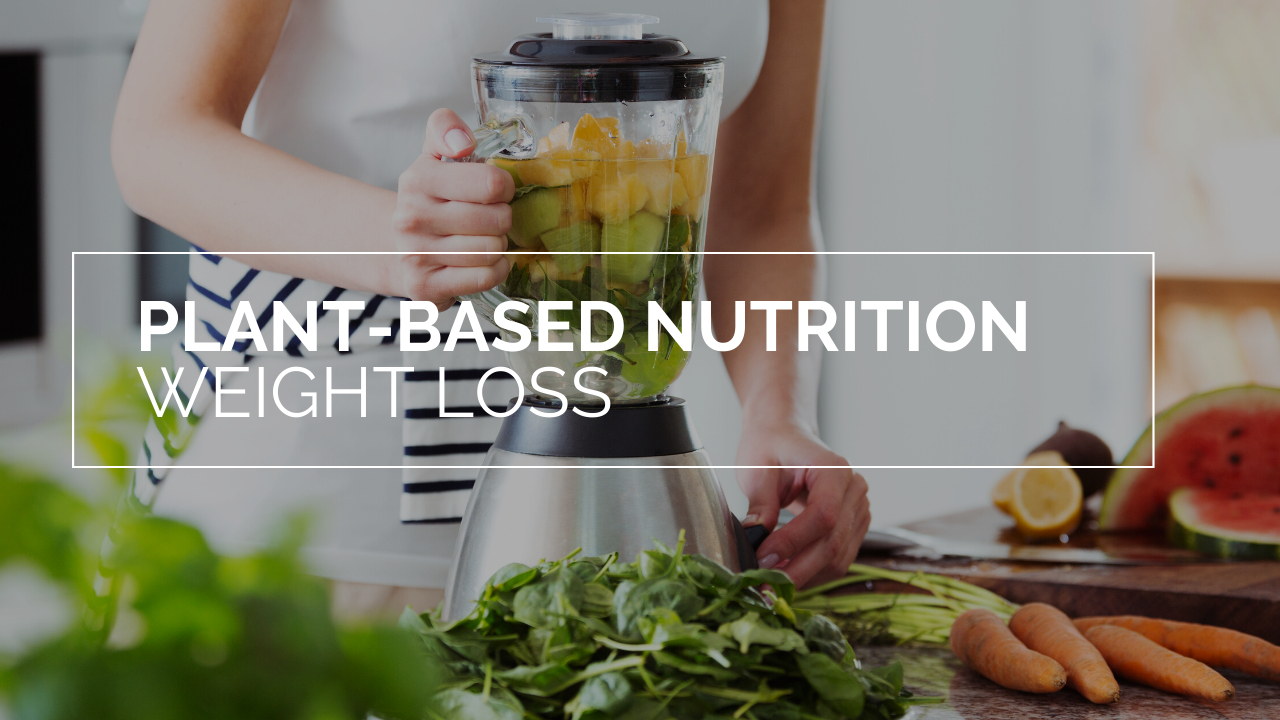Weight Loss and Plant-Based Nutrition

You can't out train a bad diet.
Weight loss. Diet and exercise fads and books and supplements and exotic miracle cures – you name it – weight loss products are an enormous money-making industry. Some people look for an easy way to lose weight, and some people put in tremendous effort following one of the many restriction-based diets that remain popular.
The simplest way to understand weight gain versus weight loss is Calories in versus Calories out. People who want to lose weight essentially need to ensue they have what’s called a caloric deficit. This means that they are spending more calories (just living, exercising, etc.), than they are taking in in the form of food. While we’re on this topic, a helpful thing to know is that one pound of fat is around 3,500 calories, so in order to lose about a pound a week, you’d have to create a DEFICIT of about 3,500 calories per week, which would work out to about 500 calories a day. That might mean forfeiting one or two snacks and exercising more.
There are many more intricate factors that either aid or inhibit weight loss – and let’s be clear here we are talking about weight loss where it’s warranted, like when you find that you are a considerable way’s away from your ideal body-mass-index, or BMI.
But yes – some people do not factor in sodium intake, for example. If your diet has too much salt in it, you will retain more water. And oftentimes, the weight we carry is made up of water weight that is held by our cells. Most people know that salt causes us to retain water, but did you know that simple carbohydrates are another culprit? No wonder women have said the adage, “Straight to the Hips.” Some people notice that they can gain a pound over one or two nights just based on a couple of indulgences – BUT it is unlikely that they have gained fat! – Because remember, one pound of body fat is 3,500 calories! No, what is actually happening here is that the sugar bombs that people ingest in the form of drinks or candy bars or snacks or desserts or anything based on white flour cause a spike in insulin levels, and this causes the kidneys to REABSORB sodium rather than flushing it out. No wonder that people knowingly complain that what’s keeping them from their ideal weight is all the bread and pastries they consume! They’re right!
Also, over time, excess carbs that are not used to fuel physical activity are converted by the liver into fat, which he body, then, stores. Bad habits definitely have a compounding effect over time. Do what you can to eat as much as you need and avoid overeating, especially these simple carbs.

The fitness community has popularized a slogan, “You can’t out train a bad diet.” Believe it or not, the secret to weight loss is in what you eat and don’t eat. It takes incredible effort and time to undo the effects of a simple but bad eating habit. It’s best to correct these at the source rather than spending an extra hour on the treadmill.
Make sure that you are taking care of the other factors that are important to good health and optimal weight – including adequate sleep! Inadequate or irregular sleep inhibits our body’s functions and may actually cause us to gain weight we otherwise wouldn’t.

Lastly, a topic of research that has gotten a fair bit of attention is time-restricted fasting, or TRF. It’s a pretty intricate topic that we don’t have the time to fully unpack here. But you can read up on it yourself. The idea is that the number of hours straight you spent NOT eating in a 24-hour period is significant to either weight loss or maintaining your ideal or healthy weight. Research has shown that it is best for a person to do all their eating within a 12-hour window and, thus, leave a 12-hour window during which the body undergoes a short-term fast. So if your first meal is an early-morning breakfast at 6 a.m., ideally you’d want to have eaten your last mean (dinner) by 6 p.m. Intentionally restricting all your food intake into a 12-hour period, statistically speaking, keeps you from overeating. It’s a good way to avoid those late-night tortilla chips and salsa. Look into it and see how you can adopt this principle.
And again, focusing on getting most of your food intake from whole fruits and vegetables sets you on a foundation to make you less likely to overeat (think of all that fiber that’s keeping you satisfied and make you less susceptible to eating too many sugars and simple carbs that get stored along with water weight and fat. Going plant-based automatically helps you avoid some of the pitfalls that lead to excess weight gain. So set yourself well on the path of maintaining your optimal weight, feeling great, and feeling like you can tackle anything
About the Author:
Stevan Mirkovich, Certified in Plant-Based Nutrition
Plant-based living literally saved his life. As a recovering food addict, he's journeyed through overeating, junk-food veganism, and finally found the life-giving ways of a whole-foods plant-based style of living. Stevan has guided hundreds of people, introducing them to plant-based nutrition, cooking and shares education to help by break down the stigmas and myths that many people encounter as they transition to a better way of eating.
Stay connected!
Join our newsletter to be up to date on all things Planted!

